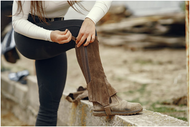Advice from a Cowboy Store Near You: Why You Need to Condition Leather
Posted by Jackson's Western Store on Jan 10th 2022
Could there really be any western wear or tack without quality leather? Cowboy boots, belts, chaps, gloves, and even some cowboy hats are made from this durable, practical natural material. Saddles and other tack are made from leather too.
It’s tough, reliable, and flexible, which allows it to form to the user over time. That’s why a broken-in, well-worn pair of cowboy boots are so comfortable. They actually form to, and cushion and support, the unique contours of your feet.
But leather is only as good as the user. It will only remain soft, supple, and supportive for as long as its owner cares for it.
Like other natural materials, such as wood and fur, leather needs to be cleaned and, more specifically, conditioned from time to time.
As Michigan’s premier western outlet (our cowboy store is near Grand Rapids in Wayland, Michigan) we’re as qualified as any and more qualified than most to weigh in on this.
Here’s why you need to condition your leather products, whether they be boots, gloves, or an old saddle.
Leather: Absorption Goes Two Ways
Leather, regardless of whether it comes from a cow, a lamb, a moose, a buffalo, or even an ostrich, is skin. That is the ultimate reason it is durable, flexible, and comfortable.
Much like skin, leather is a complex material consisting of interconnected layers made up of intersecting fibers. Before it is treated, it contains a wide range of oils and other native compounds that make it better able to withstand the stresses of flexing and stretching. These oils are removed during the tanning process.

As a result, tanned leather has a higher porosity than raw leather, which makes it highly absorbent. Tanned but otherwise untreated leather is extremely porous and absorbent - think of a chamois cloth (another type of leather) that is used to absorb moisture from a car’s surface and used in finishing.
Leather boots and other clothing and accessories will drink up whatever moisture you expose them to - which can be both bad and good.
It’s bad because if you don’t treat your leather goods with a waterproofing agent, or condition them with a specially formulated leather conditioner or oil, they will absorb whatever moisture comes in contact them with - notably, water.
Leather can absorb water without experiencing too much damage, up to a point. Most of the problems with water absorption come not from the water but rather from how quickly the leather dries out.
When leather gets saturated, the fibers swell. Once the leather starts to dry out, the fibers start to shrink again, and typically at different rates. This puts an enormous amount of stress on the fibers. Leather that has become wet and dried out too quickly will often deform, harden, or even crack.
Similarly, the longer leather remains untreated, the more it will continue to dry out. A trace amount of oils remain in leather even after it is tanned, helping to keep it supple and soft. Over time, these oils will leave the leather, and the leather will become brittle and stiff. Dry leather can even crack. These conditions cannot be reversed - only prevented.
Protecting Against Overexposure to Moisture
The best thing you can do to help leather remain fresh, soft, and supportive is to keep it well conditioned or oiled. There are a couple of good reasons for this.
One is that conditioning oil with a specific leather cream, conditioner, or oil, will help keep the leather from excessively drying out over time. It will help keep the leather soft and durable while preventing it from becoming brittle or cracking when used properly.
The other is that conditioning leather will help protect it from overexposure to moisture. When you introduce some of the pores in the leather to oil, it will soak them up. By virtue of the oil’s presence, that same space can then not be filled with water. That is, leather conditioner helps prevent the leather from soaking up too much moisture.
Now, leather will still absorb some water on contact, but far less than if it were untreated. Moreover, and most importantly, conditioned leather helps regulate the evaporation of water that the leather did absorb, preventing it from drying out too quickly and suffering any other water-related damage.

Maintaining the Natural Integrity of Leather’s Natural Fibers
By using a leather conditioner conscientiously, you can also extend the life of the fibers that constitute the leather. Leather, even full-grain leather, is prone to cracking and delamination when the fibers dry out excessively. A leather conditioner or oil can help prevent this.
Leather can also be stressed by other chemicals that the right conditioners can guard against, such as road salts. For example, road salts can be suspended in water that the leather absorbs. At a minimum, these salts can cause discoloration, at their worst they can cause bubbling, deformation, or cracking.
Salts are also extremely hygroscopic, which means that they absorb water very readily. When introduced to wet leather, the salt will absorb water, “sucking the leather dry” in a manner of speaking. Properly conditioned leather will be guarded against rapid moisture loss, further protecting it against chemical stressors.
Leather Conditioning: Dos and Don’ts
Before you condition or oil your leather, whether it’s a pair of boots or gloves, observe the following guidelines from the professionals at our cowboy store near Grand Rapids, Michigan:
●Clean leather before use with an appropriate leather cleaner or saddle soap, as dirt and dust can be abrasive to the surface of leather.
●Apply oil or conditioner to warm, but not hot, leather, as warm leather will more readily absorb it.
●Do not overapply the oil or conditioner. A little goes a long way and too much can cause discoloration, oxidation, or even damage the leather.
●Condition or oil as soon as you start to notice creasing or signs of wear on leather. Creasing is the predecessor to cracking, so give your leather a drink when you notice creases forming.
Get Some More Western Wit and Wisdom from Our Cowboy Store Near You
Interested in learning more about leather care? Do you have specific questions about leather maintenance? Want to get in touch with some of the professionals at our cowboy store near Grand Rapids? Come visit us or pay us a call and we’d be more than happy to help!
You can visit us at our cowboy store near Grand Rapids at 1110 W. Superior Street in Wayland, Michigan, or get in touch with us by phone at 269-792-2550. Let us know how we can help or what questions you still have and we’d love to set the record straight.

